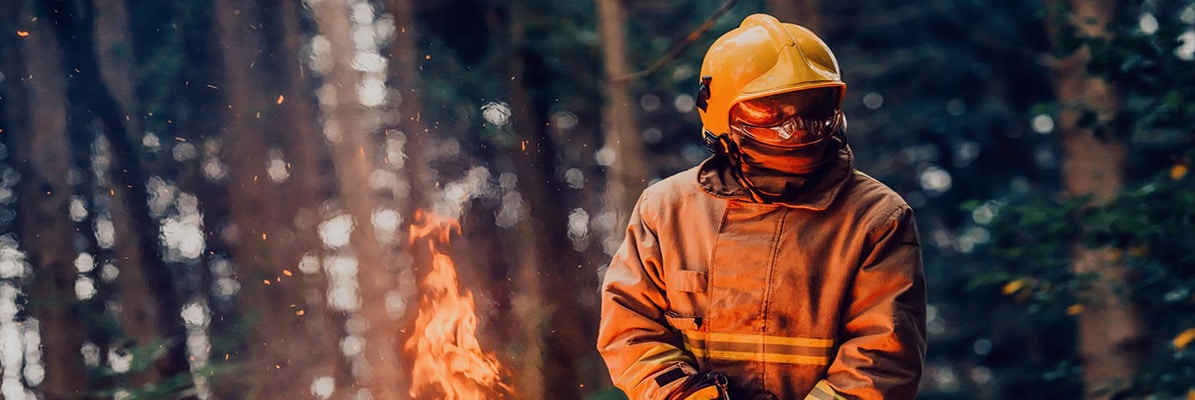
Colorado Workers’ Comp for Firefighters & First Responders
Learn how to get maximum compensation if you’re injured in the line of duty
Colorado firefighters and first responders are known for their heroic acts to preserve the lifes and safety of the people in their community and beyond. On any given day, a firefighter or first responder might be called upon to handle anything from a minor car accident with injuries to a raging forest wildfire.
In fact, in a single year, Denver firefighters responded to 84,953 alarms, including 45,688 medical calls and 685 structure fires.
If you’re a firefighter or first responder, the nature of your job puts you at serious risk of injury, so it’s vital to understand how Colorado’s workers’ compensation system can help you recover compensation for medical expenses and lost wages if you’re injured in the line of duty.
Common injuries to firefighters and first responders
While most employees practice how to exit their workplace during a fire, firefighters are trained to run straight into burning buildings. Although their firefighting gear and intense training prevent them from sustaining many potential injuries, the unfortunate truth is that firefighters and first responders still get hurt as they work hard to mitigate emergency situations.
Burn injuries are a major risk to firefighters. Intense levels of fire and heat exposure leave them at risk for severe burns that can extend through layers of skin and muscle.
Other serious injury risks to firefighters include:
- Broken bones
- Internal organ damage
- Heat exhaustion
- Overexertion injuries like muscle sprains and strains and hernias from carrying heavy hoses and equipment
- COPD and occupational cancer from exposure to smoke and hazardous materials
These workers also commonly suffer back, neck and traumatic brain injuries from the following:
- Falls from heights
- Blows to the head due to violent assaults or falling debris
Notable cases of work-related firefighter and first responder injuries
You don’t have to look far to find news stories that are filled with descriptions of firefighters’ heroic acts, but there are a few that stand out. Reading through these stories is a stark reminder that our nation’s heroes face some of the most serious costs to their health when they’re called to respond to an alarm.
September 11, 2001
No one can forget the tragic day when firefighters and emergency responders rushed to the aid of those who were trapped in the World Trade Center towers after the terrorist event that changed the lives of everyone in the United States.
While many injuries and deaths occurred in the immediate aftermath, many first responders also faced lingering health problems, including respiratory disease and PTSD, that often take weeks or months to surface.
Police Officer McLoughlin
Sergeant John McLoughlin was working alongside other first responders when the South Tower collapsed above him. Trapped for several hours in the rubble, he was finally rescued by the NYPD rescue team.
Sergeant McLoughlin suffered a broken leg and pelvis, along with respiratory disease. Since then, he’s become an advocate for firefighters and emergency responders who develop occupational illness or injuries while serving in the line of duty.
Granite Mountain Hotshots
The Granite Mountain Hotshots were well known for being a team of highly experienced and tight-knit firefighters. In 2013, the Yarnell Hill Fire erupted in a small Arizona mountain community, taking the lives of 19 out of 20 of these brave firefighters. Their story, which is recognized as being the greatest loss of life among the U.S. fire service since 9/11, is portrayed in the 2017 movie Only the Brave.
Understanding PTSD and its coverage under Colorado workers’ comp
Post-traumatic stress disorder (PTSD) affects many firefighters and first responders who witness or experience tragic events while on the job. Emotional distress, flashbacks and physical symptoms like anxiety and insomnia are all common symptoms of PTSD.
Fortunately, the state of Colorado has expanded workers’ compensation benefits in recent years to include those who develop PTSD as a consequence of performing their job duties.
How Colorado’s workers’ compensation system works
The workers’ compensation system in Colorado is meant to provide employees with benefits for injuries or illnesses that develop from performing their job duties without having to file a civil lawsuit and go through the typical legal process. In Colorado, most employers with at least 1 employee are required to provide workers’ compensation insurance to their employees.
Colorado’s workers’ comp system is based on the no-fault concept, which means that in most cases, first responders are eligible for benefits even if their actions contributed to the accident that caused their injury or illness. This is especially important for emergency responders who may be forced to make rapid decisions in harrowing circumstances that could lead to disability injuries.
Related read: Differences in workers’ compensation law
Are volunteer firefighters and first responders eligible for workers’ compensation?
In Colorado, volunteer firefighters, police officers and other emergency service workers may be deemed to be employees by their city or county government when they’re performing their duties. The state also has laws that provide coverage for people who develop certain conditions, such as specific forms of cancer or skin problems, after serving for at least 5 years as a service provider.
Types of workers’ comp benefits provided to employees in Colorado
Firefighters and emergency responders in Colorado may be eligible to receive the following types of benefits.
- Lost wages. Injured workers are typically entitled to two-thirds of their average weekly wage if they’re unable to work while they recover from their injuries. The length of time you can receive these disability benefits depends on your disability.
- Medical benefits. All necessary medical treatment is covered under workers’ comp, including surgeries, rehabilitation, medication and medical devices.
- Death benefits. These are paid to a worker’s dependents if they die from a work-related injury or illness.
Benefits Available Under a Colorado Workers’ Compensation Claim
If you or a loved one is injured at work or diagnosed with an occupational disease, you’re likely entitled to certain benefits under the Colorado Workers’ Compensation Act.
How to file a workers’ compensation claim in Colorado
Once you experience a physical or emotional trauma, it’s important to take the following steps to ensure you remain eligible for compensation:
- Seek medical care. Since firefighter injuries tend to occur in catastrophic circumstances, you should first seek emergency medical attention. Medical documentation is also important because it will provide proof that your injury or illness occurred on the job.
- Report your injury. If you’re physically and mentally able, you’re required to report the injury to your employer within 10 days. You should also use the physician that is specified by your employer.
- Your employer notifies their insurer. Your employer then has 10 days to notify their insurance company about the incident, and you should receive a decision to accept or deny the claim within 20 days.
- Contact an attorney. If your employer refuses to notify their insurer or your claim is denied, you should contact an attorney for help with the filing process.
When to consider filing a claim against a 3rd party
In some cases, a 3rd party (someone other than your employer) is responsible for the accident that led to injuries. For example, if you were involved in an accident with a negligent driver or were injured by equipment with a manufacturer’s defect, a 3rd-party lawsuit is possible.
Filing a 3rd-party claim in these instances could help you receive compensation in addition to the benefits you receive through workers’ compensation. An experienced workers’ compensation attorney can help determine if a 3rd-party lawsuit is appropriate for your case.
How a workers’ comp attorney helps firefighters with workers’ comp claims
Every employee has a right to workplace safety, even if you serve in a role that routinely puts your life in danger. Firefighters and first responders often encounter challenges to their workers’ comp claims that can complicate the process. If a 3rd party was involved, then an attorney can make sure that the appropriate parties are held responsible for their actions that led to the incident.
An attorney can also help you with your work injury claim if your employer or their insurance company fails to meet an important deadline or refuses to acknowledge that your illness or injury occurred while you were performing your duties. An attorney will gather evidence and negotiate with your employer and their insurance company to ensure you get the maximum benefits after your injury.
Contact a Colorado workers’ compensation attorney
If you’re a firefighter or first responder who’s been injured while volunteering or working in Colorado, you’re entitled to workers’ compensation benefits while you recover from your injury. Because the process can be complicated and even small mistakes can impact your ability to recover full benefits, it’s always best to consult an experienced workers’ compensation attorney to help you with the process.
At The Babcock Law Firm, our Denver workers’ compensation attorneys are ready to answer your questions and get you the help you need. We offer no-cost, no-obligation initial consultations, so contact our offices today.


